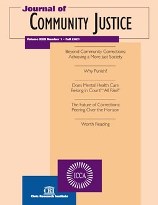Opioid Use Disorder Treatment and Disengagement from the Criminal Legal System
Author: Albert M. Kopak.; Sierra D. Thomas.; Sarah Friedman.; C. Micha Belden.
Source: Volume 34, Number 02, Winter 2025 , pp.5-11(7)

< previous article |next article > |return to table of contents
Abstract:
Substance use disorder treatment has been recognized as an effective practice for people in recovery, many of whom have been incarcerated and continue to be involved in the criminal legal system. Although the evidence supporting treatment continues to strengthen, especially as it relates to symptom management and overdose prevention for those with opioid use disorder, less is known about the process by which people who are receiving medication for opioid use disorder (MOUD) disengage from the criminal legal system. To improve our understanding of disengagement from the criminal legal system, a total of 27 structured interviews were conducted and 14 follow-up semi-structured interviews were completed with patients receiving treatment at an office-based opioid treatment (OBOT) clinic in Buncombe County, North Carolina. Several key findings emerged, and participants who were able to effectively manage their substance use disorder while maintaining their recovery with the support of MOUD, are expected to close out their cases and disengage from the legal system in the near future. MOUD was valued by nearly all (92%) patients for its ability to help manage opioid use disorder, and the medication also appeared to attract positive attention from most (71%) criminal legal system officials, such as probation and parole officers, who seemed to recognize the benefits of the treatment. Lastly, recent involvement in activities that could have resulted in arrest, most of which were related to drug possession, introduced significant risks to continued involvement in the criminal legal system. In addition to advocacy efforts to expand equitable access to MOUD, better strategies are needed to help patients further reduce their risk of rearrest and increase the likelihood of disengagement from the criminal legal system.Keywords: Substance use disorder, Medication for opioid use disorder (MOUD), criminal legal system, office-based opioid treatment (OBOT), risk of rearrest
Affiliations:
1: UNC Health Sciences, Asheville NC; 2: UNC Health Sciences, Asheville NC; 3: Western North Carolina Veterans Association Health Care System; 4: University of North Carolina at Chapel Hill.